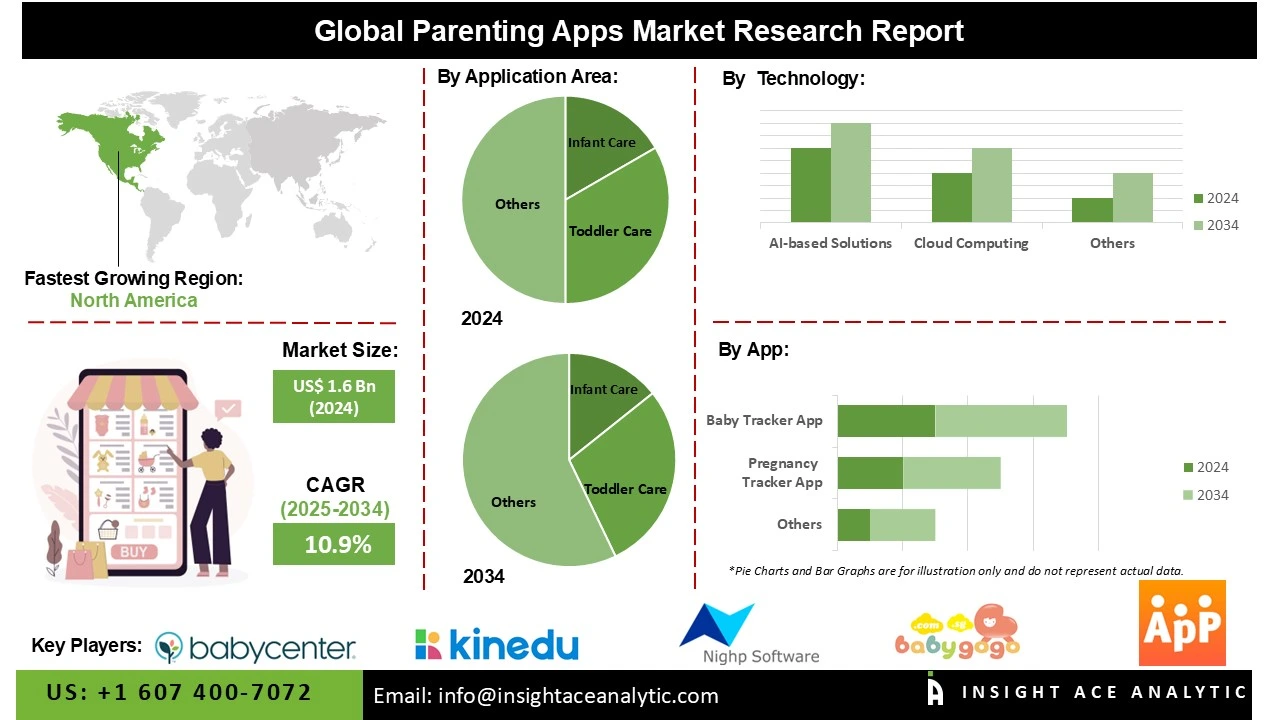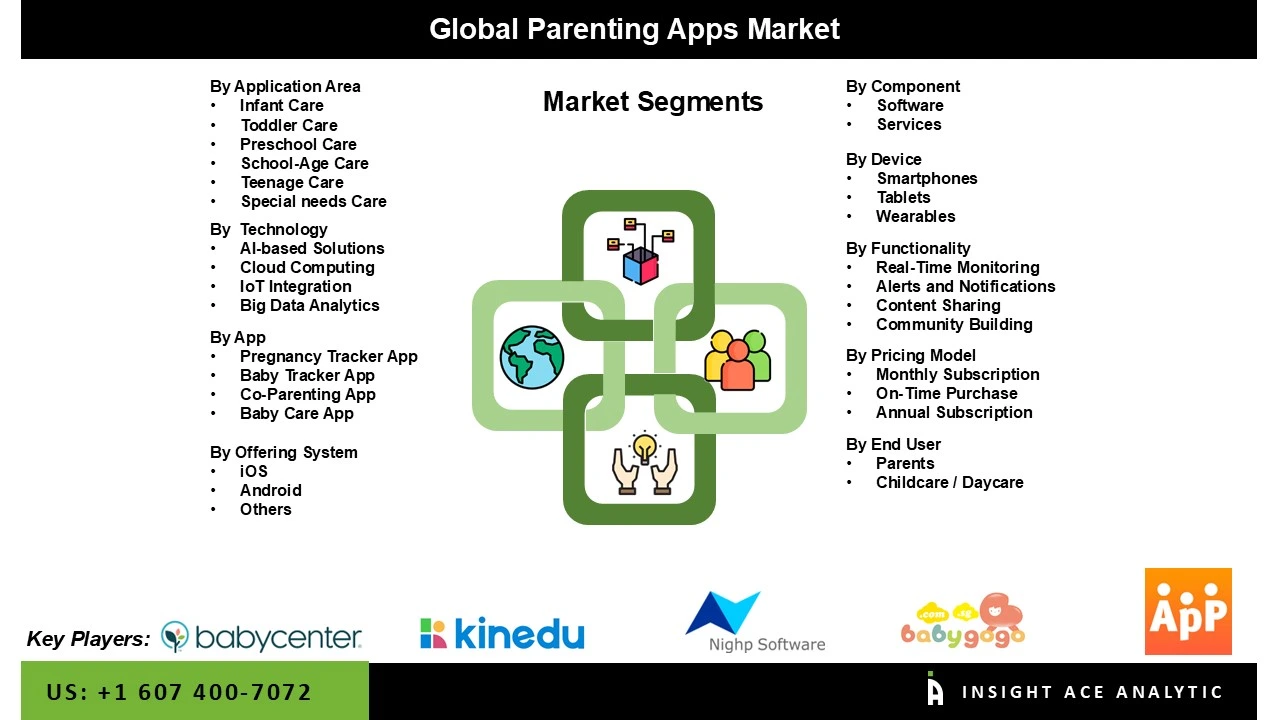Parenting Apps Market Size is valued at US$ 1.6 Bn in 2024 and is predicted to reach US$ 4.5 Bn by the year 2034 at an 10.9% CAGR during the forecast period for 2025-2034.

Parenting apps are digital platforms designed to assist parents in managing child-rearing tasks by offering tools for tracking growth, health, education, and behaviour, along with expert advice, reminders, and community support to inform their parenting decisions. The parenting apps market is experiencing significant global growth, mainly driven by the increasing use of smartphones. As the number of parents relying on mobile devices to manage their day-to-day activities increases, parenting apps offer a convenient solution for tracking children's development, health, education, and behaviour.
Smartphones allow the delivery of timely notifications, customized content, and easy access to expert information, making the apps an indispensable resource for modern parents. Widely available access to inexpensive smartphones, combined with internet connectivity, has also helped raise the user base. Increased awareness among parents regarding the safeguarding of their children, digital learning resources, and mental health support also contributes to the growing adoption rates of parenting apps, thereby boosting user awareness and retention.
The parenting apps industry is undergoing significant growth, driven by the increasing adoption of baby care apps for tracking infant health and development. Modern parents are increasingly relying on smartphone apps to track schedules for feedings, sleep, diaper changes, and growth achievements, thus facilitating better management of childcare.
The apps offer customised information, alerts, and device-to-device data synchronisation, hence the sense of convenience and peace of mind. The incorporation of artificial intelligence and Internet of Things-enabled devices, including smart wearables and baby monitors, also enhances functionality. In addition, the improved smartphone penetration, enhanced awareness of child health, and the digital parenting movement are driving the market's growth, particularly among tech-savvy millennials and Gen Z parents.
Some of the Key Players in the Parenting Apps Market:
· AppClose
· BabyCenter
· BabyGogo
· Kinedu
· Monitored Communications
· nighp Software
· Parent Cue
· Ovia Health
· WebMD
· XO Group
The parenting apps market is segmented by type of operating system, by type of app, by application area, by type of component, by type of device, by type of functionality, by pricing model, by type of technology, by end user and by region. By type of operating system, the market is segmented into iOS, and android. By type of app, the market is segmented into pregnancy tracker app, baby tracker app, co-parenting app, and baby care app. By application area, the market is segmented into infant care, toddler care, preschool care, school-age care, teenage care, and special needs care. By type of component, the market is segmented into software and services.
By type of device, the market is segmented into smartphones, tablets, and wearables. By type of functionality, the market is segmented into real-time monitoring, alerts & notifications, content sharing, and community building. By pricing model, the market is segmented into monthly subscription, on-time purchase, and annual subscription. By type of technology, the market is segmented into AI-based solutions, cloud computing, IoT integration, and big data analytics. By end-user, the market is segmented into parents, and childcare/daycare.
In 2024, the android held the major market share over the projected period due to the widespread use of Android smartphones and increasing digital adoption among young parents. These apps include features like baby monitoring, development tracking, health tips, and parenting forums, hence improving accessibility and convenience. The integration of machine learning to offer customized advice, together with the existence of free or affordable versions on the Google Play Store, encourages use. Rising realization of the importance of childcare development as well as health monitoring using cell phone technology drives market growth.
The parenting apps market is dominated by baby tracker app as parents increasingly seek digital tools to manage childcare efficiently. These apps help monitor feeding times, sleep schedules, diaper changes, and developmental milestones, providing real-time insights into a baby’s health and habits. The rise in smartphone usage, coupled with busy lifestyles and nuclear families, is boosting demand for convenient parenting solutions. Moreover, integration of AI-based analytics, reminders, and health recommendations is enhancing user engagement, driving significant growth in the global parenting app market.
North America dominates the market for parenting apps due to region’s increasing smartphone penetration and growing awareness of digital parenting solutions. Parents are turning to mobile apps for guidance on child development, health tracking, and educational activities.
The rise of working parents and busy lifestyles fuels demand for convenient, real-time parenting support. Additionally, advancements in AI and data analytics enhance app personalization, offering tailored advice and reminders. Strong internet connectivity, high digital literacy, and growing investments in family-focused tech startups further boost market expansion.
Moreover, Europe's parenting apps market is also fueled due to the region’s increasing smartphone penetration and a tech-savvy parent population seeking digital tools for childcare management. Working parents rely on these apps for tracking baby health, feeding schedules, sleep patterns, and developmental milestones. The expansion in nuclear families and busy lifestyles fuels the need for digital parenting help. Moreover, rising awareness of child mental health and education, along with AI-based personalized content and multilingual features, expands user engagement and boosts market expansion across Europe.
| Report Attribute | Specifications |
| Market Size Value In 2024 | USD 1.6 Bn |
| Revenue Forecast In 2034 | USD 4.5 Bn |
| Growth Rate CAGR | CAGR of 10.9% from 2025 to 2034 |
| Quantitative Units | Representation of revenue in US$ Bn and CAGR from 2025 to 2034 |
| Historic Year | 2021 to 2024 |
| Forecast Year | 2025-2034 |
| Report Coverage | The forecast of revenue, the position of the company, the competitive market structure, growth prospects, and trends |
| Segments Covered | By Type of Operating System, By Type of App, By Application Area, By Type of Component, By Type of Device, By Type of Functionality, By Pricing Model, By Type of Technology, By End User and By Region |
| Regional Scope | North America, Europe, Asia Pacific, Latin America, Middle East & Africa |
| Country Scope | U.S., Canada, Germany, The UK, France, Italy, Spain, Rest of Europe, China, Japan, India, South Korea, Southeast Asia, Rest of Asia Pacific, Brazil, Argentina, Mexico, Rest of Latin America, GCC Countries, South Africa, Rest of the Middle East and Africa |
| Competitive Landscape | AppClose, BabyCenter, BabyGogo, Kinedu, Monitored Communications, nighp software, Parent Cue, Ovia Health, WebMD, and XO Group. |
| Customization Scope | Free customization report with the procurement of the report, Modifications to the regional and segment scope. Geographic competitive landscape. |
| Pricing and Available Payment Methods | Explore pricing alternatives that are customized to your particular study requirements. |
Parenting Apps Market by Type of Offering-
· iOS
· Android
· Others

Parenting Apps Market by Type of App-
· Pregnancy Tracker App
· Baby Tracker App
· Co-Parenting App
· Baby Care App
Parenting Apps Market by Type of AI Solution-
· Standard / Off-the-shelf AI solutions
· Personalized AI solutions
Parenting Apps Market by Application Area-
· Infant Care
· Toddler Care
· Preschool Care
· School-Age Care
· Teenage Care
· Special needs Care
Parenting Apps Market by Type of Component-
· Software
· Services
Parenting Apps Market by Type of Device-
· Smartphones
· Tablets
· Wearables
Parenting Apps Market by Type of Functionality-
· Real-Time Monitoring
· Alerts and Notifications
· Content Sharing
· Community Building
Parenting Apps Market by Pricing Model-
· Monthly Subscription
· On-Time Purchase
· Annual Subscription
Parenting Apps Market by Type of Technology-
· AI-based Solutions
· Cloud Computing
· IoT Integration
· Big Data Analytics
Parenting Apps Market by End-User-
· Parents
· Childcare / Daycare
Parenting Apps Market by Region-
North America-
· The US
· Canada
Europe-
· Germany
· The UK
· France
· Italy
· Spain
· Rest of Europe
Asia-Pacific-
· China
· Japan
· India
· South Korea
· Southeast Asia
· Rest of Asia Pacific
Latin America-
· Brazil
· Argentina
· Mexico
· Rest of Latin America
Middle East & Africa-
· GCC Countries
· South Africa
· Rest of the Middle East and Africa
This study employed a multi-step, mixed-method research approach that integrates:
This approach ensures a balanced and validated understanding of both macro- and micro-level market factors influencing the market.
Secondary research for this study involved the collection, review, and analysis of publicly available and paid data sources to build the initial fact base, understand historical market behaviour, identify data gaps, and refine the hypotheses for primary research.
Secondary data for the market study was gathered from multiple credible sources, including:
These sources were used to compile historical data, market volumes/prices, industry trends, technological developments, and competitive insights.

Primary research was conducted to validate secondary data, understand real-time market dynamics, capture price points and adoption trends, and verify the assumptions used in the market modelling.
Primary interviews for this study involved:
Interviews were conducted via:
Primary insights were incorporated into demand modelling, pricing analysis, technology evaluation, and market share estimation.
All collected data were processed and normalized to ensure consistency and comparability across regions and time frames.
The data validation process included:
This ensured that the dataset used for modelling was clean, robust, and reliable.
The bottom-up approach involved aggregating segment-level data, such as:
This method was primarily used when detailed micro-level market data were available.

The top-down approach used macro-level indicators:
This approach was used for segments where granular data were limited or inconsistent.
To ensure accuracy, a triangulated hybrid model was used. This included:
This multi-angle validation yielded the final market size.
Market forecasts were developed using a combination of time-series modelling, adoption curve analysis, and driver-based forecasting tools.
Given inherent uncertainties, three scenarios were constructed:
Sensitivity testing was conducted on key variables, including pricing, demand elasticity, and regional adoption.